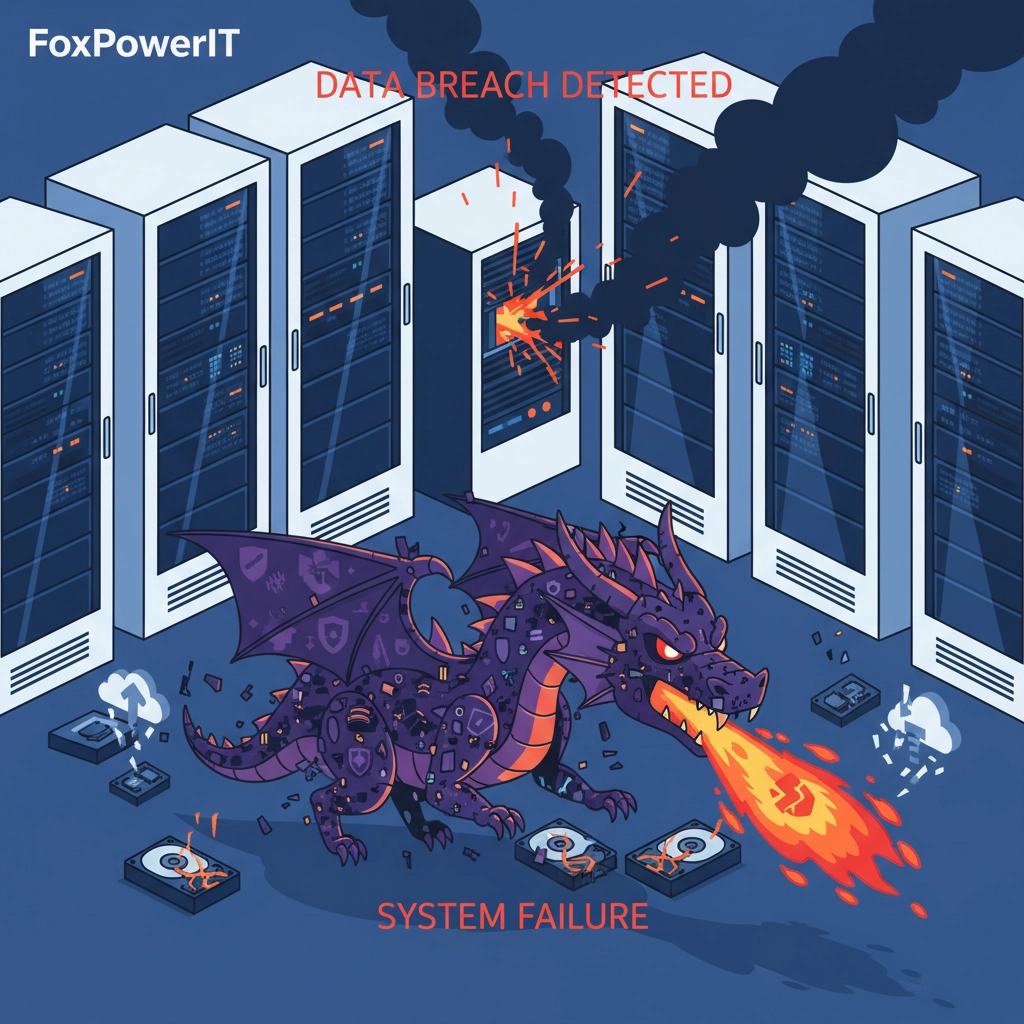Picture this: It's Monday morning in your Connecticut office. Your team arrives ready to tackle the week, but the phones aren't working, emails won't send, and your server is making an ominous grinding noise. Your IT support company? They're "looking into it" while your business bleeds money by the minute.
If this scenario sounds familiar, you're not alone. IT support nightmares happen to businesses across Connecticut every single day: and the cost goes far beyond just fixing broken equipment. We're talking about lost productivity, frustrated customers, damaged reputations, and in some cases, businesses that never recover.
At FoxPowerIT, we've seen it all. From ransomware attacks that could have been prevented with basic security measures to "comprehensive" support contracts that left businesses high and dry when they needed help most. These aren't just horror stories: they're expensive lessons that Connecticut small and medium businesses can't afford to learn the hard way.
Smart Paws, our trusted fox mascot, has witnessed enough IT disasters to fill a library of cautionary tales. Today, we're sharing five real horror stories (with names changed to protect the victims) that illustrate exactly how IT support can go wrong, and more importantly, how Connecticut businesses can protect themselves from similar fates.

Horror Story #1: The Email Emergency That Cost $15,000
The Victim: A 25-employee law firm in Hartford
The Problem: Their email system crashed on a Thursday morning
The Real Horror: Their "comprehensive" IT support didn't actually cover email
Sarah thought she had done everything right. As the managing partner of a growing law firm in Hartford, she had researched IT providers thoroughly before signing a monthly support contract with a local company. The sales rep had promised "comprehensive IT support" that would cover all their technology needs.
When their Exchange server crashed on a busy Thursday morning: right in the middle of a major case deadline: Sarah called their IT provider expecting immediate assistance. Instead, she was told that email server support wasn't included in their monthly plan and would cost $200 per hour for emergency service.
"But you said comprehensive support," Sarah protested.
"Comprehensive desktop support," the technician clarified. "Email servers are considered infrastructure, which is a separate service tier."
While lawyers scrambled to communicate via personal Gmail accounts and missed critical client deadlines, the IT company spent two full days "diagnosing" the problem. The final bill? $3,200 for the emergency repair, plus another $12,000 to properly configure their backup systems that should have prevented the disaster in the first place.
The real kicker? A simple backup verification process, performed monthly, would have caught the failing backup system that left them vulnerable. The law firm lost two major clients who questioned their ability to manage sensitive information securely.
The Lesson: Vague service agreements are ticking time bombs. If your IT provider can't clearly explain exactly what's covered and what isn't, you're heading for disaster.
Horror Story #2: The Ransomware Attack That Started With a Single Click
The Victim: A dental practice in New Haven with 15 employees
The Problem: A "harmless" email attachment
The Real Horror: No employee training, no backups, and an IT company that disappeared
Dr. Martinez ran a successful dental practice in New Haven. His IT company had installed "the latest antivirus software" and assured him his network was secure. What they hadn't done was provide any cybersecurity training for his staff or set up proper backup systems.
On a quiet Tuesday afternoon, his office manager received an email that appeared to be from their dental supply company. The attachment looked like an invoice for recent orders. One click later, ransomware was spreading through their entire network, encrypting patient records, billing information, and years of digital X-rays.
The ransom demand was $50,000 in Bitcoin, with a countdown timer threatening to delete everything in 72 hours.
When Dr. Martinez called his IT provider for help, he discovered something terrifying: the company had gone out of business three months earlier. Their phone number was disconnected, their office was empty, and the "managed security monitoring" they had been paying for monthly was non-existent.
With no backups and no IT support, Dr. Martinez faced an impossible choice: pay the ransom or lose everything. He paid the $50,000, but the attackers never provided the decryption keys. His practice was forced to close for three weeks while a new IT company rebuilt their entire system from scratch. The total cost exceeded $200,000, and several patients found new dental providers during the disruption.
The Lesson: Cybersecurity isn't just about software: it's about training, backups, monitoring, and having a trusted partner who will be there when disaster strikes.

Horror Story #3: The "Expert" Who Nearly Destroyed a Manufacturing Company
The Victim: A precision manufacturing company in Waterbury
The Problem: A server migration gone wrong
The Real Horror: An IT "expert" who wouldn't admit he was in over his head
Connecticut Manufacturing Solutions had been growing steadily for 20 years, but their aging server was slowing them down. Their IT consultant, Mike, assured them he could migrate everything to a new server over the weekend with "zero downtime."
Mike had been handling their basic IT needs for years: printer issues, password resets, software updates. How hard could a server migration be?
Very hard, as it turned out.
Mike started the migration on Friday evening, confident he'd be done by Saturday afternoon. By Sunday night, nothing was working. Customer orders were trapped in the old system, inventory databases were corrupted, and the manufacturing equipment that relied on the server couldn't operate.
Instead of admitting he was in over his head, Mike spent the entire next week trying to fix problems he had created. With each "solution," things got worse. Production ground to a halt. Customers started canceling orders. Employees were sent home because they literally couldn't do their jobs.
Finally, on Wednesday, the company owner fired Mike and brought in a professional IT services company. It took them three days and $25,000 to undo Mike's mistakes and properly complete the migration. The total cost to the business: including lost production, canceled orders, and employee downtime: exceeded $150,000.
The most infuriating part? A proper server migration, handled by qualified professionals, would have cost $8,000 and been completed without disruption.
The Lesson: Being cheap on IT support is the most expensive mistake you can make. Knowing how to reset passwords doesn't qualify someone to handle mission-critical infrastructure.
Horror Story #4: The Mysterious Case of the Vanishing Backups
The Victim: An accounting firm in Stamford
The Problem: A hard drive failure during tax season
The Real Horror: Three years of "backups" that were never actually backing up
Peterson & Associates had learned from other businesses' mistakes. They had specifically requested a comprehensive backup solution from their managed IT provider, and they were paying $300 monthly for "automated cloud backups with daily verification."
Or so they thought.
During the peak of tax season, their main server suffered a catastrophic hard drive failure. No problem, they figured: they had three years of daily backups to restore from. But when their IT provider attempted to restore the data, they discovered something that made everyone's blood run cold: the backup system hadn't been working for over two years.
The monitoring alerts that should have warned them about backup failures? They were being sent to an email address that no longer existed. The "daily verification" reports? They were automatically generated based on scheduled backup jobs, not actual backup verification. The monthly fees they'd been paying? Those were real, but the service they were supposed to be buying wasn't happening.
With tax deadlines looming and no data to restore, Peterson & Associates faced a nightmare scenario. They had to notify hundreds of clients that their tax information was gone. Some clients had provided only digital copies of documents, which were now permanently lost.
The firm managed to reconstruct about 60% of their client data through bank records, client copies, and painstaking manual work. But they lost 40% of their client base, faced multiple lawsuits, and ultimately had to close their doors after 25 years in business.
The Lesson: Trust but verify. Regular backup testing isn't optional: it's the only way to know your backups will work when you need them.

Horror Story #5: The Phone System "Upgrade" That Killed Customer Service
The Victim: A medical equipment supplier in Bridgeport
The Problem: A VoIP migration that went catastrophically wrong
The Real Horror: Three weeks without reliable phone service during their busiest season
MedSupply Connecticut had been using the same phone system for 15 years, and it was showing its age. When their IT vendor recommended upgrading to a modern VoIP system, it seemed like a smart investment. Better features, lower costs, and "seamless integration" with their existing systems.
The installation was scheduled for a weekend, with assurances that everything would be working perfectly by Monday morning. Instead, Monday morning brought chaos.
Calls were dropping randomly. When customers did get through, the audio quality was so poor that conversations were nearly impossible. The system couldn't handle multiple calls simultaneously, so potential customers heard busy signals during peak hours. Worse, the integration with their customer database had failed, so staff couldn't pull up customer information during calls.
The IT vendor insisted these were "minor configuration issues" that would be resolved quickly. Three weeks later, with customer complaints flooding in and sales plummeting, the company finally admitted the truth: their IT vendor had never actually implemented a VoIP system before. They had watched YouTube tutorials and figured they could learn on the job.
MedSupply lost $200,000 in sales during those three weeks of phone system hell. Even after bringing in VoIP specialists to fix the problems, it took six months to win back customers who had switched to competitors during the outage.
The Lesson: New technology implementations aren't learning opportunities for your IT provider. If they haven't successfully deployed the solution before, find someone who has.
The Smart Paws Approach: How FoxPowerIT Prevents These Nightmares
At FoxPowerIT, Smart Paws has seen enough IT disasters to know that prevention is always better than reaction. Here's how we help Connecticut businesses avoid these expensive horror stories:
Crystal Clear Service Level Agreements
We don't believe in surprise bills or hidden exclusions. Our service agreements clearly specify response times, covered services, emergency procedures, and costs for any additional work. If email servers are part of your infrastructure, they're part of our responsibility.
Comprehensive Security Training and Monitoring
Every client receives regular cybersecurity training for their entire team. We don't just install antivirus software and hope for the best: we provide ongoing education about phishing, social engineering, and safe computing practices. Our network monitoring services watch for threats 24/7.
Proven Expertise in Everything We Offer
Before we recommend any solution, we ensure our team has successfully implemented it multiple times. We don't experiment with your business-critical systems. When we suggest a server migration or phone system upgrade, it's because we've done it before and know exactly how to do it right.
Real Backup Verification
Our backup systems include automated testing that actually restores small amounts of data to verify the backups work. You receive detailed reports showing not just that backups ran, but that the data can be successfully recovered. We test disaster recovery procedures regularly, so if the worst happens, we know exactly how to get you back online quickly.
Strategic Partnership, Not Just Technical Support
We don't just fix problems: we prevent them. Our infrastructure management approach includes proactive monitoring, regular system health checks, and strategic planning to ensure your technology supports your business growth rather than hindering it.

Red Flags: How to Spot IT Support That Will Become a Horror Story
Smart Paws has developed a keen eye for spotting IT providers who are disasters waiting to happen. Here are the warning signs Connecticut businesses should watch for:
Vague Service Descriptions: If they can't clearly explain what's included in your monthly fee, run. Phrases like "comprehensive support" and "complete IT solutions" often mean nothing is actually guaranteed.
Rock-Bottom Pricing: IT support isn't a commodity. If their price is dramatically lower than other quotes, there's a reason: and it's not because they're more efficient.
No Emergency Contact Information: If you can't reach them outside business hours, what happens when your systems fail at 2 AM or over the weekend?
No References or Case Studies: Reputable IT providers are proud to share success stories and client references. If they won't provide them, there's probably a good reason.
One-Person Operations: While some solo IT consultants are excellent, mission-critical support requires backup. What happens when your one-person IT company gets sick, goes on vacation, or goes out of business?
No Formal Change Management: If they make changes to your systems without documentation, approval processes, or rollback plans, you're gambling with your business continuity.
Promises That Sound Too Good to Be True: "Zero downtime," "100% security," and "maintenance-free systems" are promises that experienced IT professionals know they can't make.
The True Cost of IT Support Nightmares
The horror stories we've shared aren't just about technology failures: they're about business failures. When IT support goes wrong, the ripple effects touch every aspect of your operation:
Lost Revenue: Every hour your systems are down, you're losing money. For small businesses, extended outages can mean the difference between profitability and bankruptcy.
Customer Defection: In today's competitive market, customers won't wait for you to fix your problems. They'll find a competitor who has their act together.
Regulatory Compliance Issues: Industries like healthcare, finance, and legal services face severe penalties for data breaches or compliance failures caused by inadequate IT security.
Reputation Damage: Word travels fast in Connecticut's tight-knit business community. A major IT disaster can damage your reputation for years.
Employee Productivity: Nothing destroys team morale like technology that doesn't work. When employees can't do their jobs efficiently, the best ones start looking elsewhere.
Recovery Costs: Fixing problems after they occur is always more expensive than preventing them. Emergency IT repairs, data recovery, and business continuity costs can easily reach tens of thousands of dollars.
Building IT Resilience: The Connecticut Advantage
Connecticut businesses have unique advantages when it comes to building resilient IT infrastructures. Our state's concentration of financial services, healthcare, manufacturing, and professional services companies means we have access to world-class IT expertise and proven best practices.
The key is partnering with an IT provider who understands both the opportunities and challenges facing Connecticut businesses. Whether you're dealing with HIPAA compliance in healthcare, SOX requirements in finance, or the operational demands of manufacturing, your IT partner should have specific experience in your industry.
Smart Paws reminds us that foxes are known for being clever, adaptable, and always thinking several steps ahead. Those same qualities define the IT support approach that Connecticut businesses need to thrive in today's competitive environment.
Taking Action: Your Next Steps
Don't wait for an IT disaster to force your hand. Here's what Connecticut business owners should do right now:
Audit Your Current IT Support: Can you clearly explain what services you're paying for? Do you have emergency contact information? When was your backup system last tested?
Document Your Business Requirements: What systems are truly mission-critical? What would happen if each system was unavailable for an hour? A day? A week?
Get Multiple Opinions: If you're experiencing any IT issues or concerns, get assessments from multiple providers. Different perspectives can reveal problems you didn't know existed.
Plan for Growth: Your IT infrastructure should support your business goals, not limit them. Make sure your IT partner understands where you want to be in five years, not just where you are today.
Invest in Prevention: Proactive monitoring, regular maintenance, and comprehensive security measures cost far less than recovering from major failures.
The IT support horror stories we've shared aren't inevitable. With the right partner, clear expectations, and proactive planning, Connecticut businesses can build technology infrastructures that drive success rather than create nightmares.
Smart Paws knows that the best IT support is the kind you never have to think about: because everything just works. That's the standard we set for every FoxPowerIT client, and it's the peace of mind every Connecticut business deserves.
Don't become the next IT horror story. Contact FoxPowerIT today to learn how we can help your Connecticut business build a technology infrastructure that supports your success, protects your data, and gives you the confidence to focus on what you do best( running your business.)

